New German government charts cautious climate course for Europe's largest economy
Germany on track for 2030 targets?
Contents
THE LATEST
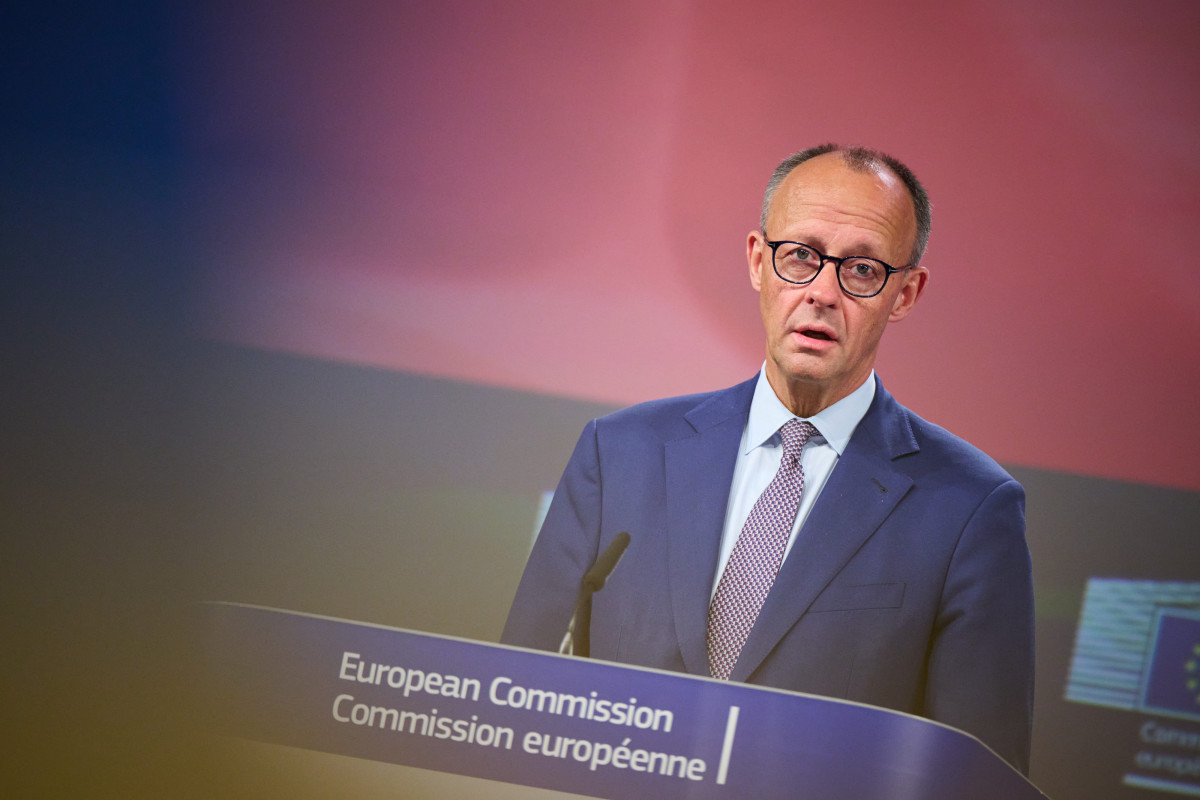
Merz government's first 100 days clouded by lingering energy transition uncertainty
Many activists and industry representatives agree that the government coalition of Germany's new chancellor, Friedrich Merz, has reached the 100-day mark in office with a subpar record on advancing the country's energy transition. The coalition's resolute debut included lowering energy prices and reforming Germany's debt brake to enable funding for infrastructure and climate neutrality projects. However, the efforts have been overshadowed by announcements that some observers fear could slow or even undermine decarbonisation aims. Merz's government is under pressure to present compelling plans for climate action and industry greening following the summer break, prior to a number of state election campaigns next year.
Read the article here.
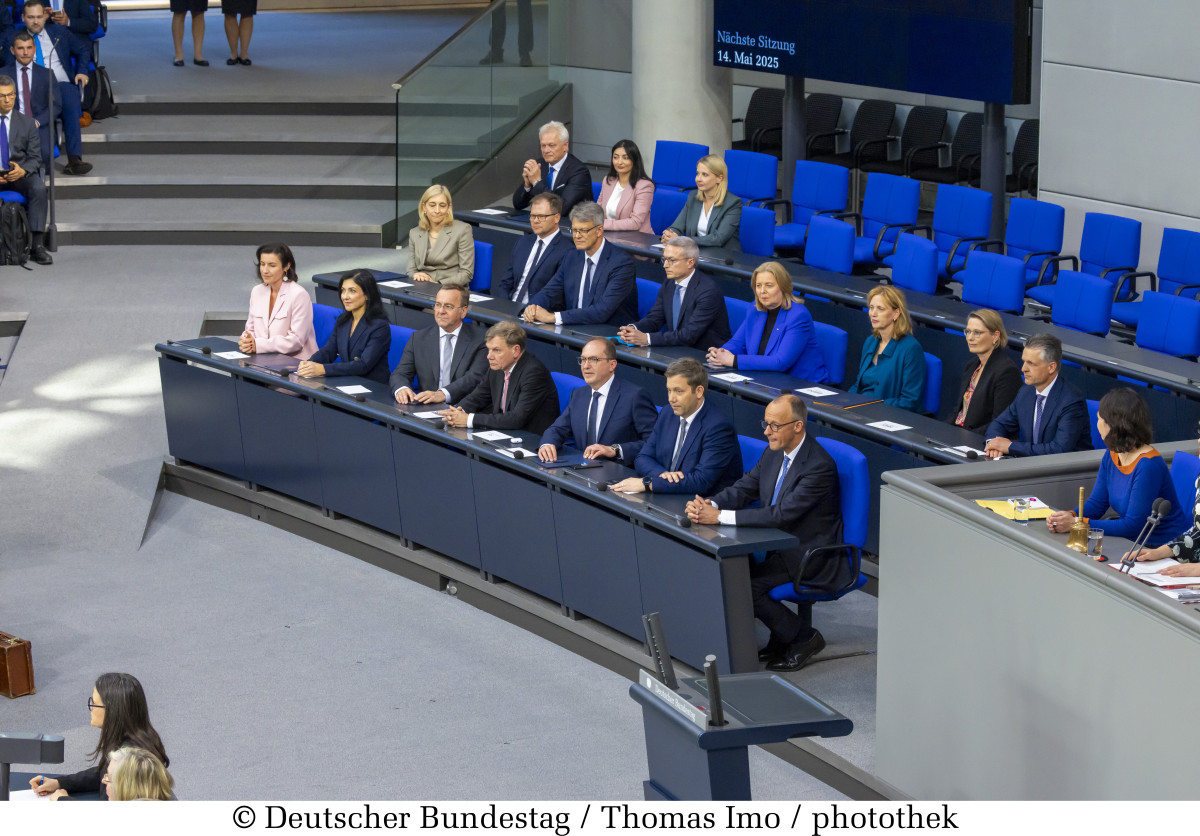
Merz government urged to table convincing climate and energy plans in first 100 days
The six-month wait for a new German government came to an end when Friedrich Merz was finally confirmed as chancellor in a day of high drama in parliament on 6 May. Stakeholders and observers have urged the new chancellor to keep energy and climate decisions high on his government’s agenda. If done correctly, a fresh resolve in the decarbonisation and transformation of the EU’s largest economy could couple greater European cohesion and sovereignty with Merz’s key promise on the campaign trail to revive Germany’s industry. But the unprecedented dissent at the chancellor’s election ceremony could have foreshadowed lingering conflict lines.
Read the analysis here.
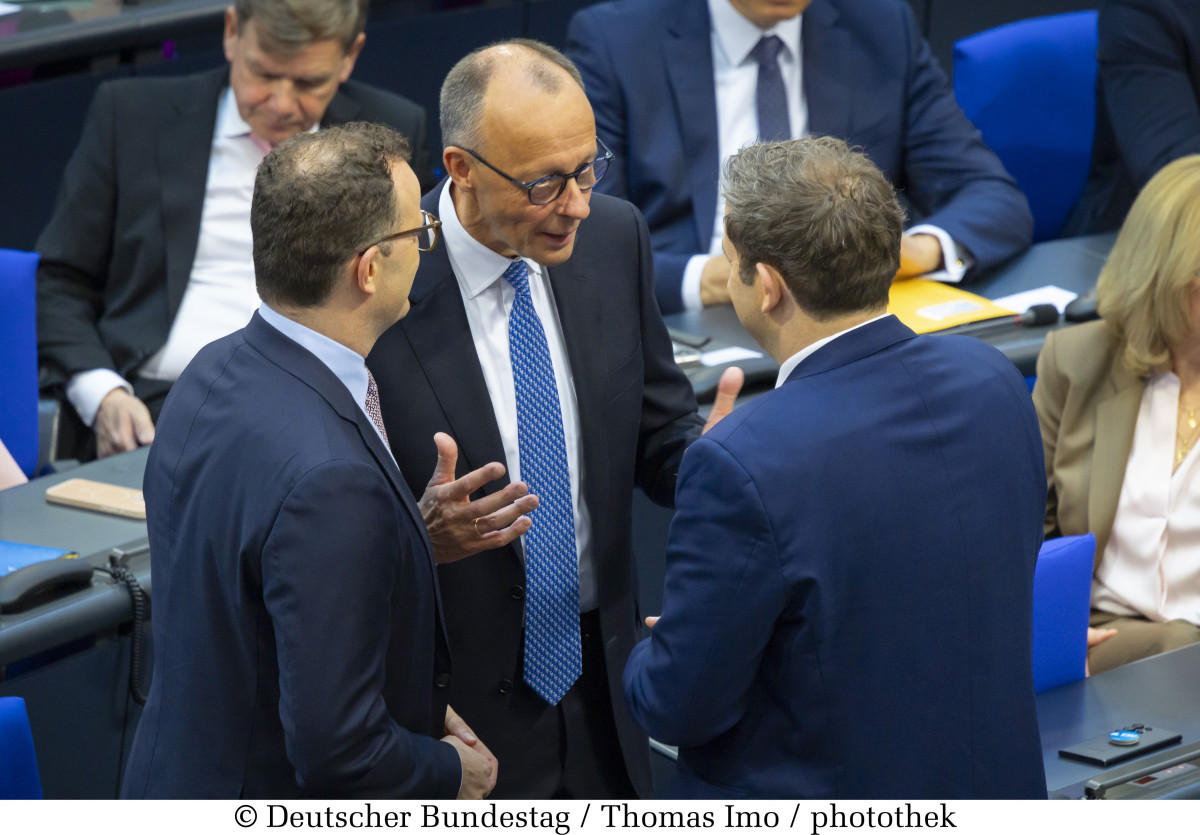
Germany’s new government with bumpy start after Merz needs unprecedented second vote for chancellor
In a bumpy start to Germany’s new coalition government, conservative leader Friedrich Merz managed to secure a majority in parliament to become the next chancellor only in the second round of voting. The unprecedented failure to immediately establish clarity on a chancellor vote in the first round does not directly impede his government’s ability to act. However, political commentators said that the lacking support by several lawmakers from the coalition parties bodes ill for the coalition’s future cohesion in other questions.
Read the article here.
THE MAKE-UP OF GERMANY'S NEW GOVERNMENT AND MINISTER PROFILES
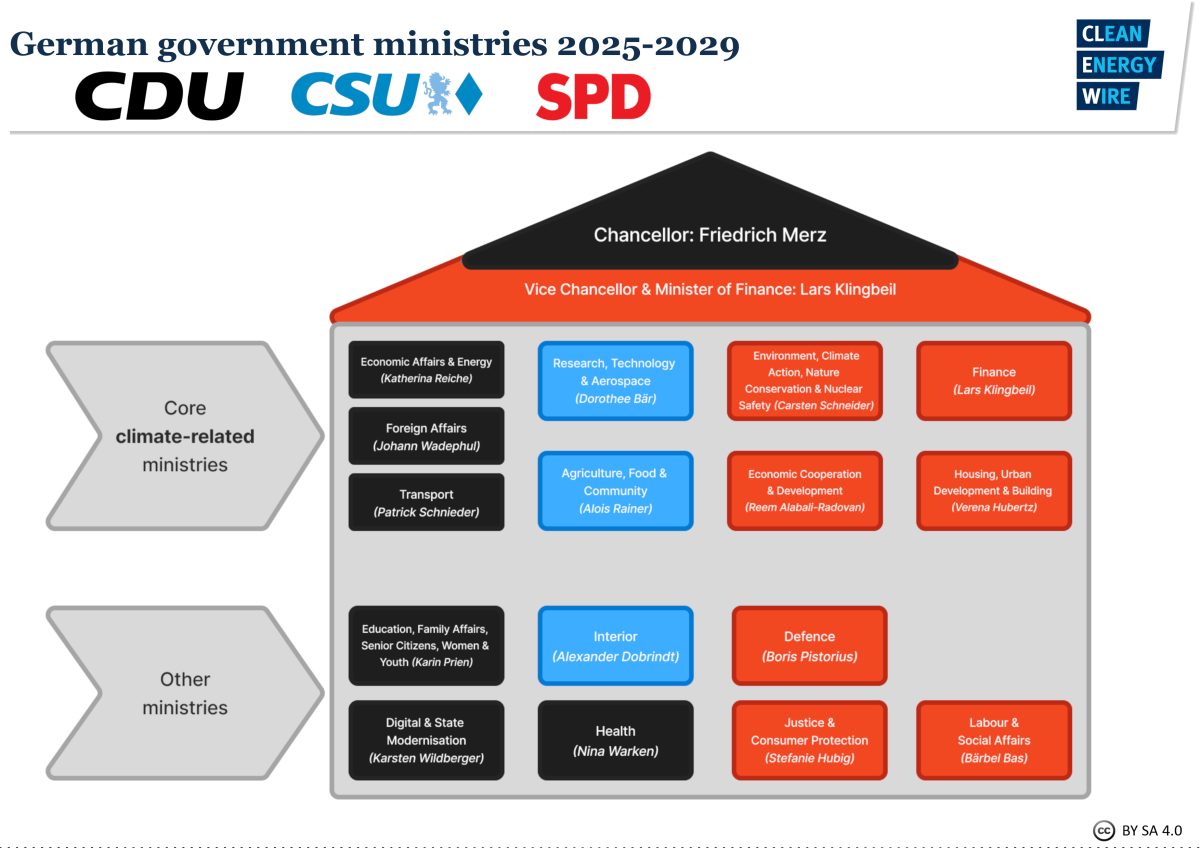
Germany's government – Who shapes climate and energy policy under chancellor Merz?
The new coalition government of chancellor Friedrich Merz's conservative CDU/CSU alliance and the Social Democrats (SPD) has signalled continuity on energy transition policy. The cabinet includes both expert ministers – like utility manager Katherina Reiche as economy and energy minister – and those with little experience in their new field of responsibility.
This factsheet provides an overview of the government make-up and its role in shaping German energy and climate policy in the coming years.

German chancellor candidate Merz must walk fine line between restart and continuity in energy and climate
The conservative CDU leader Friedrich Merz is widely tipped to become Germany’s next chancellor – but remains ambiguous on a range of policy fields, notably on energy and climate. Despite being known as a senior policymaker for decades, Merz’s long stint in the private sector not only sets him apart from previous chancellor candidates but also raises a range of questions regarding his priorities as head of government. Many voters regard Merz’s experience in the corporate world as an asset during a difficult time for the German economy. Others are worried that climate action could slide down on the agenda, as the conservative leader seeks to distance himself from the previous centre-left government and its decarbonisation focus. But many industry leaders still are in the dark what Merz plans to do on energy and climate instead.
Read the profile here.

Experienced energy manager is Merz’s “surprise” pick for heading Germany’s economy ministry
Conservative CDU member Katherina Reiche looks set to become Germany’s new economy and energy minister in a government led by Friedrich Merz as chancellor. Reiche looks back at ten years in the energy industry, where she assumed leading positions as one of only a handful of female CEOs after dropping out as a member of parliament in 2015. The pick has surprised many observers but was welcomed by leading stakeholders, who hailed Reiche’s experience in the field. Reiche herself has described climate action as a task that requires immediate action to comply with the Paris Agreement.
Read the profile here.

Germany’s pick for transport minister signals cautious approach in “problem child” sector
The choice for Germany’s new transport minister suggests the country is unlikely to face a profound policy overhaul to get the emission-intensive sector on track to meet ambitious 2030 climate targets. Long-serving conservative parliamentarian Patrick Schnieder is an outspoken advocate of improving road and rail infrastructure in rural areas, and has shown little appetite for climate-centric reforms. But Germany’s newly established 500-billion-euros infrastructure fund means Schnieder could oversee significant public transport improvements.
Read the profile here.

Designated German climate minister could push transition with experience bridging political divide
Germany’s designated next environment minister Carsten Schneider may not have much background in climate policy, but his experience in navigating political divide in the country’s east and its population’s fatigue of constant changes could help him advance the transition towards net zero. The former minister of state for Eastern Germany will be responsible for putting the country on a path towards 2030 climate targets and leading the government’s international climate policy efforts.
Read the profile here.
Aspiring German government opts for energy transition continuity
Germany’s prospective government has agreed in its coalition treaty to continue the country’s landmark energy transition without major adjustments and stick to existing climate targets. Faced with economic stagnation and the geopolitical shake-up after the US election, the coalition parties – the conservative CDU/CSU alliance under chancellor-in-waiting Friedrich Merz and the Social Democratic Party – have put more emphasis on economic competitiveness than climate action. The energy industry praised the continuation of existing policy, while environmental NGOs showed relief over the treaty’s climate commitments, both on a domestic and the EU level.
Read the article here.
What Germany's 2025 coalition agreement says on climate and energy
The conservative CDU/CSU alliance and the Social Democrats want to form Germany's next government. The parties' coalition agreement shows that the next government aims to continue the country's landmark energy transition without major adjustments and stick to existing climate targets. The document outlines the parties' policy plans for the next four years and has yet to be accepted by all parties, and signed.
This factsheet breaks down what it says on climate and energy.
Reactions from energy and climate community to Germany's 2025 coalition treaty
Germany’s prospective coalition government has agreed to continue the country’s landmark energy transition without major adjustments, and stick to existing climate targets. In their coalition treaty, conservatives and Social Democrats put a stronger emphasis on economic competitiveness, while slightly toning down climate ambitions.
In this collection, we present first reactions from industry, think tanks, and NGOs to the agreement.
Below you'll find key background on Germany's new special infrastructure and climate fund, as well as key tasks for the government, and CLEW's previous reporting on the coalition building process as well as the elections.

Q&A: Germany's €500 bln infrastructure fund – What's in it for climate and energy?
Germany's prospective next coalition government has proposed a special fund worth 500 billion euros for infrastructure projects, in combination with another major defence package. Conservative leader and likely next chancellor Friedrich Merz is planning to pass the necessary constitutional changes in the outgoing parliament. This requires a deal with the Green party, who will not be part of the future government. The Greens have signalled their consent to the plans after Merz promised to earmark one fifth of the package for climate action. However, economists warn the fund must not turn into a horn of plenty for the next government, but instead boost long-term growth prospects.
This Q&A explains the fund's purpose and planned setup, the role of energy and climate issues, the reactions, and possible EU knock-on effects.

Key climate and energy tasks for Germany's next government
Germany's next government will have to tackle many climate and energy challenges - some of them it will inherit from the outgoing government, while others become more urgent as the country's 2030 targets come into sight.
This factsheet outlines tasks with an urgent need for action.

Germany's incoming coalition plans massive infrastructure boost via debt rule overhaul
Germany is on course to get a coalition government composed of the conservative CDU/CSU alliance under chancellor candidate Friedrich Merz and the Social Democrats (SPD) of the country's outgoing chancellor, Olaf Scholz. The next administration is set to continue the country's landmark energy transition, albeit with a slightly narrower focus on climate policies than under the outgoing government, which included the Green party. Weeks of extensive coalition negotiations will pass before Germany's next government is sworn in.
This dossier collects the most important developments, analyses and background on the coalition building process.
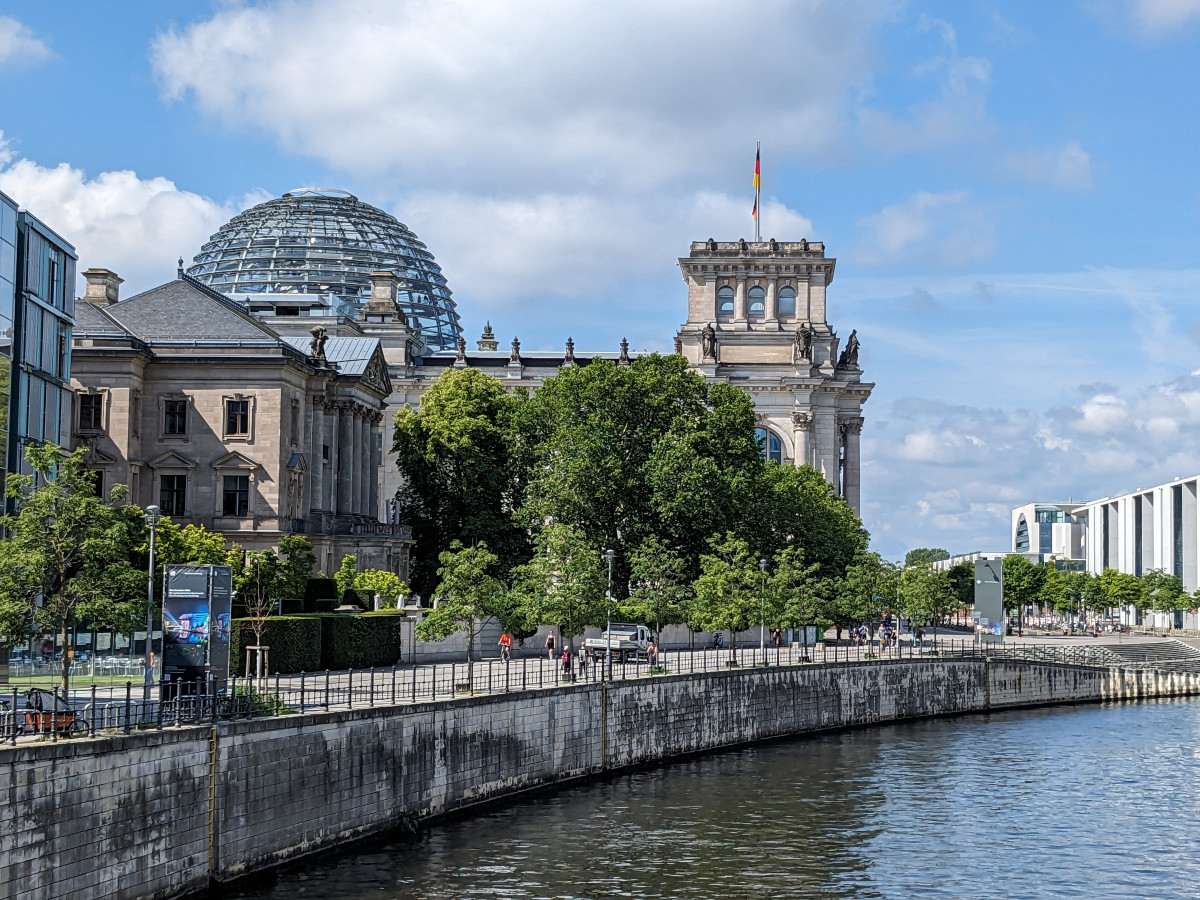
Vote25: 2030 climate and energy targets hinge on next German government
The collapse of chancellor Olaf Scholz's coalition government led to snap elections in Germany in early 2025. Climate and energy policy played a major role in the coalition break-up, and many decisions key for reaching binding 2030 climate targets are in limbo. Putting the country on track for its numerous emissions cutting and energy transition ambitions until the end of the decade will be the task of the next government.
This dossier provides background on the coalition government's collapse, the parties' programmes for the snap election, and tracks related developments in Germany and abroad.
